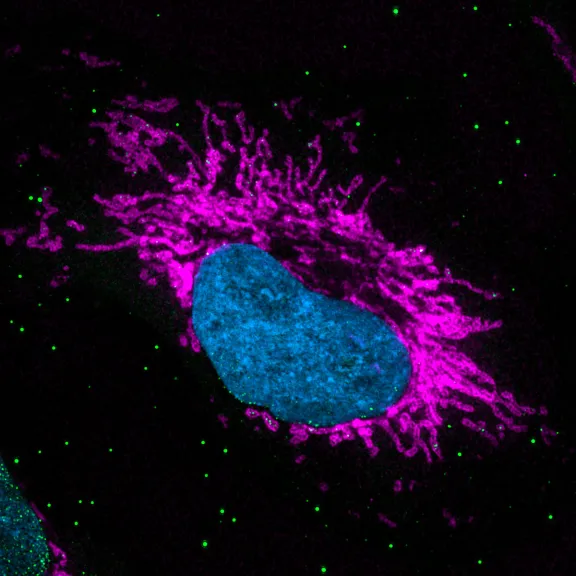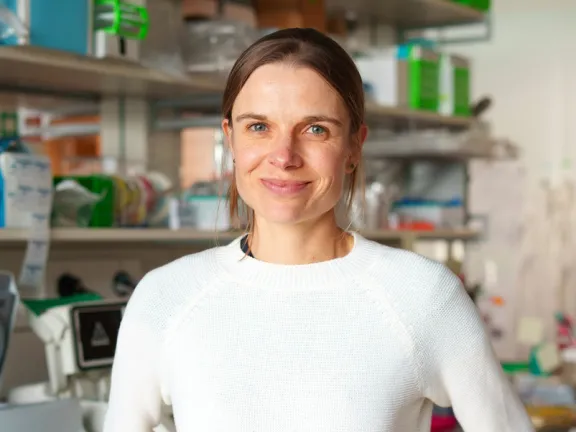Andrea Ablasser Deciphering innate immunity to develop advanced therapies
Andrea Ablasser, professor and head of the “Innate immunity” laboratory at the Global Health Institute of the École Polytechnique Fédérale de Lausanne, Switzerland
- 2024 • Liliane Bettencourt Prize for Life Sciences



Innate immunity is a first line of defence for the human body, as it protects us from the viruses and bacteria that populate our environment. It is also involved in numerous pathologies, particularly inflammatory ones. Andrea Ablasser's work seeks to understand how these defence mechanisms are orchestrated at the molecular level in a bid to develop novel therapeutic strategies.
Innate immunity, a crucial communication issue
The detection of attacks from virus and bacteria is essential. The human body does this via two key lines of defence, namely "innate" immunity, which delivers a swift reaction when a pathogen is detected, thereby producing a non-specific immune response, and "acquired" or "adaptive" immunity, whose response is highly specific, albeit slower.
The cells that constitute the innate immune system use different signalling mechanisms to recognise pathogens and communicate with each other to eradicate them. These signalling cascades are highly complex and pose a real challenge for biomedical research. Indeed, defective control of innate immunity can lead to various diseases due to chronic inflammation that takes hold in the body.
The discovery of an essential pathway
In 2013, researchers discovered a new innate immunity signalling pathway, cGAS-STING, which has revolutionised our understanding of this system. Soon afterwards, Andrea Ablasser identified a key mechanism in this pathway, enabling immunity to be activated and propagated between cells. Together with her team, she also demonstrated the role of this pathway in the immune response to tumours, suggesting an unprecedented therapeutic pathway for the treatment of cancer. Finally, a growing number of studies, including those led by Andrea Ablasser, highlight the impact of cGAS/STING in many other common inflammatory pathologies and in aging.
Despite the promise of new therapeutic avenues to explore, scientists are faced with the problem of identifying molecules capable of acting on the cGAS-STING pathway. To meet this challenge, Andrea Ablasser's team is studying how the interplay between these various stakeholders triggers the "right" immune response, i.e. a response that is adapted to the needs of the cell and the body.
New therapeutic strategies on the horizon
In order to decipher the code that regulates these innate immunity players, Andrea Ablasser and her team have established method of analysis that can be applied to any protein involved in the immune response. Drawing on their expertise in structural biology, prediction algorithms and biochemistry, the researchers intend to create an atlas of the regulatory proteins involved in innate immunity, including their different structures and their stimulating or inhibitory effects on the cGAS-STING pathway.
This work will accelerate the development of therapeutic strategies to manage cGAS-STING activity. In fact, in 2018, the team identified the first STING inhibitors and demonstrated their therapeutic potential in a preclinical auto-inflammation model. In a bid to translate this pioneering work into clinical research, Andrea Ablasser co-founded IFM-Due, a biopharmaceutical company developing medicinal products based on these inhibitors. All her work could therefore, have a significant impact on the way in which a large number of inflammatory diseases are treated.
Andrea Ablasser in a few words
Andrea Ablasser studied medicine at the Ludwig Maximilian University (LMU) in Munich, Germany, and obtained her doctor of medicine degree at the same university in 2010. After a post-doctoral fellowship at the Institute of Clinical Chemistry and Clinical Pharmacology at the University of Bonn, where she also took her initial steps as a junior team leader, Andrea Ablasser moved to the École Polytechnique Fédérale de Lausanne (EPFL). She now leads there the “Innate immunity” team. Her scientific career has been awarded by numerous prizes and distinctions, including the Eppendorf Prize for Young European Investigators and the Swiss Science Prize Latsis in 2018, as well as the Gold Medal of the European Molecular Biology Organisation (EMBO) in 2021.

-
2010 Doctor of medicine degree, Ludwig Maximilian University (LMU) in Munich, Germany
-
2014 Leads the “Innate immunity” team at the École Polytechnique Fédérale de Lausanne (EPFL)
-
2018 Swiss Science Prize Latsis
-
2021 Gold Medal of the European Molecular Biology Organisation (EMBO)
-
2024 Liliane Bettencourt Prize for Life Sciences